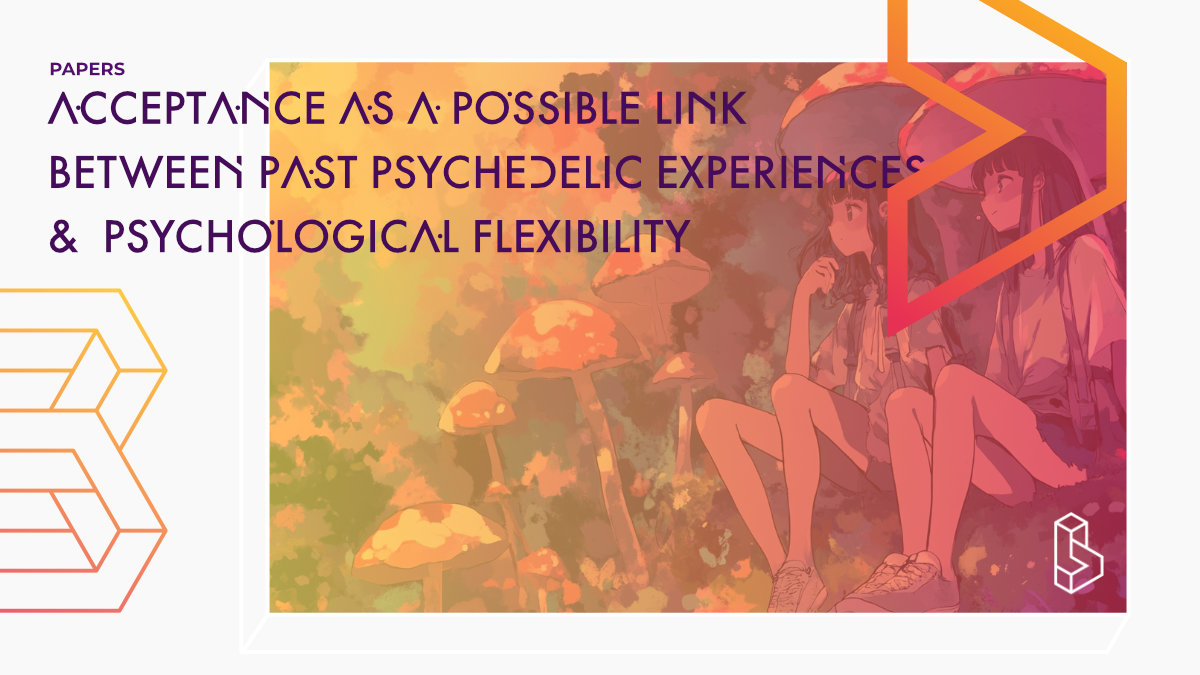This internet survey (n=629) examines how psychedelic experiences relate to psychological flexibility and mental well-being in classical psychedelic users. Network analysis shows psychological insight links to acceptance, while mediation analysis reveals psychological flexibility mediates the relationship between psychedelic use and well-being, suggesting experience quality matters more than frequency of use.
Abstract of Acceptance as a possible link between past psychedelic experiences and psychological flexibility
“Increased psychological flexibility (PF) may underlie the lasting positive effects of psychedelic experiences on mental well-being. The associations between different components of PF, psychological inflexibility (PI), and well-being with psychedelic use are not well understood. We conducted a cross-sectional internet survey of participants (N=629) with experience of classical psychedelics. Using network analysis, we examined how aspects of a single psychedelic experience (mystical-type features and psychological insights) and the frequency of past psychedelic use, were associated with current PF and PI components, as well as with mental well-being and ill-being. Mediation analyses explored whether PF mediated the relationship between past psychedelic use and well-being or ill-being. The network analysis linked psychological insight to the PF component Acceptance, with no association found between the frequency of past use and PF. Mediation analyses showed PF mediates the association between past psychedelic use and well-being and ill-being. These results suggest that the quality and depth of the psychedelic experience, rather than the frequency of use, are primarily linked to psychological flexibility, particularly Acceptance, and overall well-being. This underscores the importance of treating PF as a multidimensional construct to better understand the long-term mental health benefits of psychedelics.“
Authors: Andreas Krabbe, Pilleriin Sikka & Jussi Jylkkä
Summary of Acceptance as a possible link between past psychedelic experiences and psychological flexibility
Classical serotonergic psychedelics, including psilocybin, LSD, DMT, and mescaline, have demonstrated various positive effects on mental health and well-being in both clinical trials and naturalistic settings. Recent research has highlighted the significance of acute, psychologically transformative experiences characterised by insights and mystical-type phenomena as predictors of improved health outcomes in psychedelic-assisted therapy. Mystical-type experiences typically involve feelings of unity, sacredness, positive mood, and spiritual connectedness, while psychological insights often encompass awareness of relationships, past events, goals, and values.
The researchers explain that psychological flexibility may be a key factor contributing to the long-term therapeutic benefits of psychedelic-assisted therapy. Psychological flexibility refers to one’s ability to be present in the moment and adapt behaviour in alignment with personal values. It comprises six components: Acceptance, Defusion, Present Moment Awareness, Self-as-Context, Values clarification, and Committed Action. Conversely, psychological inflexibility includes six opposing components: Experiential Avoidance, Cognitive Fusion, Lack of Present Moment Awareness, Self-as-Content, Lack of Contact with Values, and Inaction or Impulsivity.
Preliminary research suggests that psychedelic experiences positively correlate with psychological flexibility components. For instance, psilocybin-assisted therapy has been shown to encourage connection and acceptance, while other studies have reported enhanced value connectedness following psychedelic experiences. However, most research has treated psychological flexibility as a unified construct rather than examining its individual components, potentially oversimplifying the relationship between psychedelic experiences and psychological flexibility.
Methods
Participants and Procedure
Find this paper
Acceptance as a possible link between past psychedelic experiences and psychological flexibility
https://doi.org/10.1038/s41598-024-75595-8
Open Access | Google Scholar | Backup | 🕊
Cite this paper (APA)
Krabbe, A., Sikka, P., & Jylkkä, J. (2024). Acceptance as a possible link between past psychedelic experiences and psychological flexibility. Scientific Reports, 14(1), 24253.
Study details
Compounds studied
LSD
Psilocybin
DMT
5-MeO-DMT
Mescaline
Ayahuasca
Topics studied
Healthy Subjects
Study characteristics
Survey
Participants
629
Humans

